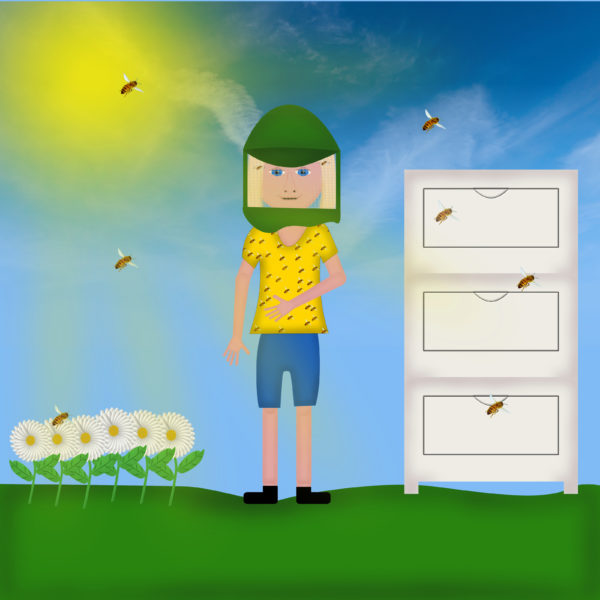A Beekeeper’s Day
“This is a perfect day to work with the bees,” said Betsy the Beekeeper. “There isn’t a cloud in the sky or any hint of wind.”
Betsy the Beekeeper was very excited. Today she was going to extract honey from the beehives. This is where she gets to see and taste the fruits of her labor.
Betsy put on her beekeeping suit, making sure no skin was exposed. She had worked with a lot of bees in her life and had never been stung. The reason for this is because she had the proper gear and she exercised extreme caution when working with the bees.
“The bees are calm today,” said Betsy, approaching the several bee boxes she had on her property.
Betsy carefully lifted one of the frames out of a bee box. She used a smoker to spray a little smoke on the frame. It was just enough for any bees on the frame to leave. She didn’t want to anger or harm the bees; she just wanted them off the frame she was currently working with.
Betsy saw a thick coat of wax on each side of the frame. She took a knife and cut through the wax. She then saw the golden honey dripping from the frame. The frame was then put into an extractor. Once the extraction process was complete, Betsy was left with lots of pure honey.
“That was a very successful day for a beekeeper,” said Betsy at the end of the day, sipping on a cup of tea with a teaspoon of honey added to it.
Betsy reflected on the importance of bees in our ecosystem. “Bees are amazing creatures,” she thought. “Not only do they produce honey, but they also play a crucial role in pollinating our plants.”
She remembered how bees visit flowers to collect nectar, which they use to make honey. During this process, bees transfer pollen from one flower to another, which helps plants reproduce. This is essential for the production of many fruits and vegetables we enjoy, like apples, strawberries, and watermelons.
Betsy decided to share her knowledge with the community. She organized a workshop at the local community center to teach people about the importance of bees and how to support them.
During the workshop, Betsy explained, “Bees are in trouble and their populations are declining due to factors like pesticide use, habitat loss, and climate change. We need to do our part to help them.”
She provided tips on how to create bee-friendly gardens by planting a variety of flowers that bloom at different times of the year, avoiding the use of pesticides, and providing fresh water sources.
The attendees were fascinated and eager to learn more. Many of them left the workshop with a new appreciation for bees and a commitment to help protect them.
As Betsy returned home, she felt a sense of accomplishment. She knew that by educating others, she was making a difference in the fight to save the bees. And, as she enjoyed another cup of tea with a teaspoon of honey, she looked forward to continuing her mission of bee conservation.
Moral of this Story:
|
